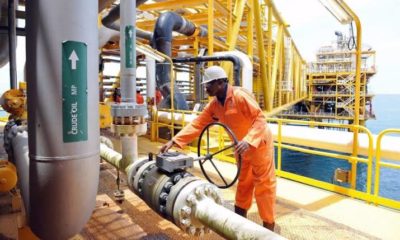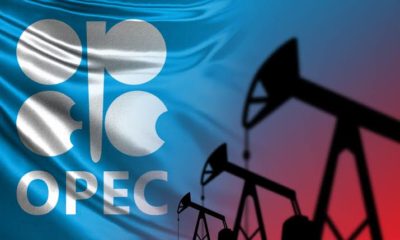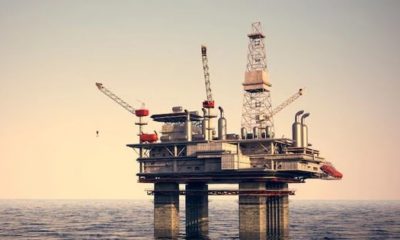Oil
Nigeria may suffer cash crunch as crude oil cargoes suffer weak demand

HOUSTON, TX-Nigeria, Africa’s Biggest Economy may be geared for tougher times as its crude oil supply schedules for January and February, 2015 seems to be currently facing an all-time low in demands.
Against the backdrop of oversupply of crude oil cargoes from both the January and February programmes, Nigerian crudes continued to fall at a steady pace due to weak demand, trading sources have said even as international crude prices continue to drop to an all time low of US$56.06.
Almost all of the key Nigerian crudes were said to be at multi-year lows, and with the picture looking even more bearish, values were expected to decline further.
The country’s flagship grade, Qua Iboe, was pegged close to Dated Brent plus $0.50/barrel on Monday afternoon. It was assessed at Dated Brent plus $0.51/b Wednesday, the lowest since April 22, 2009, Platts data showed.
Meanwhile, the consensus among many Arab OPEC producers is that, one way or another, the worldwide price of oil will stabilize then rise again during 2015, settling between $70 and $80 per barrel by the end of the year, probably without intervention from the cartel’s leadership.
“The general thinking is that prices can’t collapse, prices can touch $60 or a bit lower for some months then come back to an acceptable level which is $80 a barrel, but probably after eight months to a year,” one Gulf oil source disclosed anonymously.
However, the Nigerian market remained oversupplied with approximately 20 million barrels for January still available along with almost the entire February programme.
Traders said that as a result, crude values were expected to fall, especially with such weak buying interest from Asian and European refiners.
Asian and European demand for Nigeria and other West African cargoes has been slow so far, exacerbated by high freight rates and the availability of cheaper sweet crudes in both regions, according to Platts.
“There is a massive overhang [on WAF],” a trader was quoted by Platts as saying. “The Middle Eastern producers are encroaching on WAF buyers. They are offering eye-watering discounts. If I can buy a Murban at a $2/b discount versus Bonny Light, then Bonny Light has to come down [heavily] to compensate for the freight differentials for it just to compete. I wouldn’t be surprised if Bonny Light and Qua Iboe go to Dated Brent plus $0.30/b soon.”
Similarly, the light sweet Agbami was pegged near Dated Brent minus $0.90/b on Monday, and this grade was assessed at Dated Brent minus $0.86/b on Friday, the weakest since November 12, 2012, according to Platts data.
Traders said the January 30-31 Agbami stem had been sold by a trader at Dated Brent minus $0.90/b but details of the buyer could not be immediately confirmed. Traders said Agbami January cargoes were being offered weaker than Dated Brent minus $0.50/b and with both gasoline and naphtha cracks very weak, naphtha-rich light sweet crudes such as Akpo and Agbami were falling sharply.
“Naphtha cracks are terrible, the light [crudes] are suffering,” the trader said. “The ultra-light crudes [like Agbami] are in worse condition. The February programme for Agbami hasn’t moved at all.”
The Organisation of Petroleum Exporting Countries had in its latest monthly oil report predicted lower global oil demand for this year and 2015.
OPEC, which supplies about 40 per cent of the world’s oil, forecast that the call on the group’s crude would drop in 2015 to its lowest level in 12 years.
The projected demand for OPEC crude will be just under 29 million bpd as a result of non-OPEC supply expected to grow by 1.36 million bpd in 2015, according to the 12-member cartel.
The United states, Nigeria’s biggest Oil customer has ceased to lift a drop of oil from the West African Country in the face of increased production in the US said to have reached over 8 million barrels daily.
Oil
NNPC Discovers Over 4,800 Illegal Pipeline Connections

The Nigerian National Petroleum Company (NNPC) Limited has revealed the detection of more than 4,800 unauthorized connections on oil pipelines within the country, painting a troubling image of the nation’s primary source of revenue.
Mele Kyari, the Group Chief Executive Officer of NNPC Ltd, communicated this information to the Senate Committee on Appropriations last Friday.
He said, “We have over 4,800 illegal connections on our pipelines. That means in some lines, within 100 kilometres of pipelines, you have as much as 300 insertions.
“Therefore, even when you produce the oil, you cannot deliver them at the required pressure and therefore the volume will also be less.”
As per the NNPC Ltd chief, individuals from various regions enter the Niger Delta, inserting unauthorized connections on pipelines in Nigeria’s oil-producing area.
This recent revelation follows a prior discovery of 295 illegal connections to the pipelines by the firm a year ago, underscoring the escalating issue of crude oil theft in Nigeria.
Two years earlier, Kyari had highlighted the country’s daily loss of 200,000 barrels of oil, amounting to $13 million due to theft and vandalism.
He further stated “We have two sets of losses, one coming from our products and the other coming from crude oil. In terms of crude losses, it is still going on. On the average, we are losing 200,000 barrels of crude every day.”
After the discovery, Nigeria’s security forces pledged to enhance security around the country’s pipelines.
To bolster this, the Federal Government granted a multi-billion naira pipelines surveillance contract to Tantita Security Services, headed by former militant leader Government Ekpemepulo, also known as Tompolo.
Despite facing criticism for this decision, Senator Heineken Lokpobiri, the Minister of State for Petroleum, remains convinced that it was the appropriate course of action.
In August, following a tour of oil facilities in the Niger Delta, Senator Heineken Lokpobiri expressed gratitude to Tantita, commissioned by NNPC Ltd, for their ongoing work.
He also hinted at plans for further extensive endeavors in the future.
In 2021, after extensive debate and delays, the Petroleum Industry Bill was finally passed to attract increased foreign investment into the oil sector through amendments to regulations, royalties, and taxes.
Oil
Dangote Refinery Set To Begin Fuel Production With First Crude Arrival

Nigeria’s colossal $19 billion Dangote Refinery, after encountering several setbacks, is on the verge of kickstarting fuel production.
This achievement is heralded by the arrival of the first crude shipment, transported by the OTIS tanker carrying 950,000 barrels of Nigeria’s Agbami crude.
S&P Global, citing industry sources and tanker tracking data on spglobal.com, reported the tanker’s departure on December 6, en route to Lekki, the nearest land port to Dangote’s offshore crude receiving terminal.
Scheduled to reach its destination around 8 PM on December 7, the arrival of this shipment signifies the commencement of crude supplies for the refinery’s operations.
Chartered by the state-owned Nigerian National Petroleum Company (NNPC), the Suezmax tanker is an emblem of the initial crude supply to Dangote’s cutting-edge refinery, as disclosed by a West African oil trader familiar with the matter in the S&P report.
Even though the refinery was officially completed in May, the absence of domestic crude feedstock had hindered oil product manufacturing.
To address this, the NNPC, holding a 20% stake in the refinery, struck an agreement to provide 6 million barrels of crude oil as feedstock to the Dangote refinery in December.
This move aims to jumpstart operations and overcome the previous impediments.
Agbami, operated by Chevron, holds a prominent position among Nigeria’s major deepwater developments, producing around 100,000 barrels per day in the central Niger Delta.
Known for its light sweet crude qualities, with a specific gravity of 47.9 API and a low sulfur content of 0.04%, Agbami produces substantial amounts of naphtha and kerosene.
NNPC has chartered additional shipments from different Nigerian offshore fields to the refinery, marking the start of a sequence of planned crude supplies for the month, as mentioned by the oil trader.
Located on the outskirts of Lagos, Nigeria’s commercial hub, the Dangote Refinery encountered repeated delays since its 2013 announcement, despite significant installation progress in 2019.
The refinery, designed to handle multiple crudes simultaneously, targets three Nigerian crude grades—Escravos, Bonny Light, and Forcados. When operating at full capacity, it aims to produce 327,000 barrels per day (b/d) of gasoline, 244,000 b/d of gasoil/diesel, 56,000 b/d of jet fuel/kerosene, and 290,000 metric tons per year of propane/LPG.
Dangote’s operations starting signify Nigeria’s hopes to lessen its reliance on gasoline imports, addressing the deficiencies of its existing refineries undergoing repairs. This shift is poised to reshape Nigeria’s oil industry, potentially leading to gasoline self-sufficiency by the 2040s.
Dangote officials anticipate an initial output of 370,000 barrels per day (b/d), emphasizing jet fuel and diesel production.
Industry analysts, however, project the refinery to reach its full operational capacity by mid-2025, although potential delays remain a looming concern.
Oil
NNPCL Sets Dec 2024 Terminal Date For Fuel Importation

The Nigerian National Petroleum Company Limited (NNPCL) has announced intentions to cease importing refined petroleum products by December 2024, anticipating full operational functionality for all national refineries by that time.
Group CEO, NNPC Ltd, Mele Kyari, shared this at a meeting with Speaker Tajudeen Abbas of the House of Representatives, who advocated for the privatisation of Nigeria’s refineries on Thursday.
Projections indicated the national oil firm’s revenue could climb to N4.5 trillion by the conclusion of 2023. Moreover, the rehabilitation of the Port Harcourt Refining Company, managed by NNPCL, was slated for completion by December of the current year.
Meanwhile, Oil marketers verified on Thursday that the Port Harcourt refinery is set for operations, potentially starting in January 2024. They emphasized that once operational, this refinery could notably reduce the prices of refined petroleum products.
During the meeting in Abuja, Kyari asserted Nigeria’s intention to cease importing refined petroleum products by 2024, envisioning the country’s emergence as a net exporter of these commodities within the same year.
He outlined the plans for launching operations at the Port Harcourt, Warri, and Kaduna refineries.
Kyari reiterated that all refineries would operate at full capacity, ultimately paving the way for Nigeria to transition into a net exporter of petroleum products by the conclusion of 2024.
He attributed the inactivity of Nigeria’s refineries over the years to the petroleum subsidy, emphasizing that the removal of this subsidy was drawing significant private-sector investments into the sector.
Kyari said “I can confirm to you that by the end of December this year, we will start the Port Harcourt refinery; early in the first quarter of 2024, we will start the Warri refinery and by the end of 2024, Kaduna refinery will come into operation.
“This is the commitment we are giving today and you can hold us accountable for this. In 2024, many of the initiatives including the rehabilitation of our refineries and also the efforts of small-scale refineries, and the upcoming Dangote refinery, will make Nigeria a net exporter of petroleum products in 2024.
“We will no longer be talking about fuel importation by the end of 2024. I am very optimistic that this will crystallise.
Kyari promised that by the conclusion of 2023, the government’s anticipated revenue from the company would reach N4.5 trillion, emphasizing NNPCL’s adherence to the Petroleum Industry Act and its commitment to delivering value to shareholders.
Recall that in October 2023, it was reported that Nigeria’s monthly spending on the importation of Premium Motor Spirit, known as petrol, had reached approximately N843 billion due to NNPCL’s cessation of oil swaps.
In July of this year, the Nigerian Midstream and Downstream Petroleum Regulatory Authority reported that during the post-deregulation period, spanning June 1 to June 28, 2023, the country’s total petrol consumption amounted to 1.36 billion litres, with an average daily consumption of 48.43 million litres.
The average ex-depot price of petrol, sourced solely from NNPCL as the importer, stands at about N580 per litre.
However, both NNPCL and oil marketers declared on Thursday that this substantial oil import expenditure would soon diminish.
They anticipated a drop once the Port Harcourt refinery commences production of refined petroleum products from January 2024, barring any unforeseen circumstances.





















